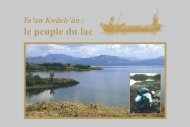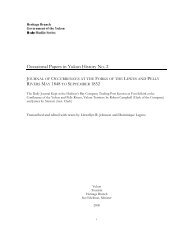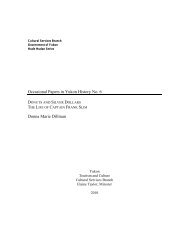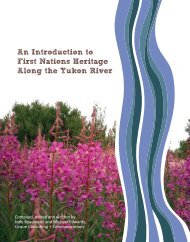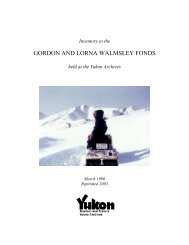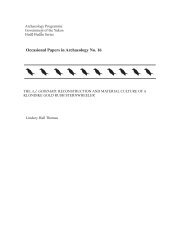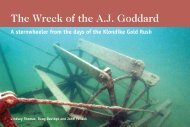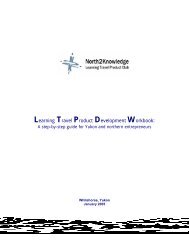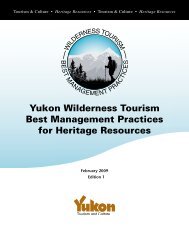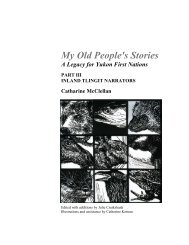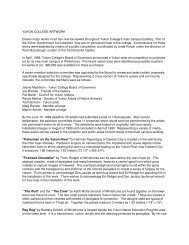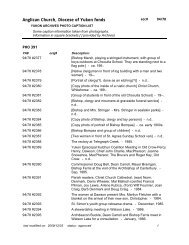Sustainable Tourism: The Tour Operators' Contribution
Sustainable Tourism: The Tour Operators' Contribution
Sustainable Tourism: The Tour Operators' Contribution
Create successful ePaper yourself
Turn your PDF publications into a flip-book with our unique Google optimized e-Paper software.
and an information package. Responses to the programme from Aurinkomatkat agents and accommodation<br />
suppliers in the destinations have been positive, and some hotel managers have provided<br />
information on their environmental performance before being asked to do so.<br />
Benefits<br />
<strong>The</strong> programme enables Aurinkomatkat to work with its partners to achieve more sustainable tourism<br />
development. Asking contract providers to give information on their environmental performance is a way<br />
of making them more environmentally aware. By fulfilling the Aurinkomatkat criteria, an accommodation<br />
supplier can gain a competitive advantage and benefit from long-term cost savings that come from water<br />
and energy conservation strategies. In addition, Aurinkomatkat will benefit from a more positive public<br />
image in terms of sustainability issues.<br />
Comments<br />
One danger in integrating environmental criteria into the contracts with hotel service providers is the<br />
risk of losing touch with the socio-cultural and economic sides of sustainability. An 800-room hotel has a<br />
different scale of impact than a six-room holiday apartment hotel, and their resources are not comparable.<br />
It is important to realize that the five-star multinational resort with eco-certificates is not necessarily a<br />
‘better’ choice than the family-owned apartment building that has no environmental programme but which<br />
employs the family next door and helps the local economy by encouraging tourists to buy food and other<br />
goods from local stores. <strong>The</strong>refore, indicators for social, cultural and economic sustainability have been<br />
integrated into the programme. Achieving the minimum level in the classification system has been made<br />
easier in order to take into account small family-owned properties that cannot invest in environmental<br />
technology to the same extent as large hotels by giving an additional five points to small-scale locally<br />
owned accommodations. Thus, a family-owned six-room holiday apartment hotel in the Greek islands<br />
that uses water- and energy-saving measures and treats its sewage appropriately will be included in the<br />
Aurinkomatkat programme. Achieving a higher environmental classification will require more investment.<br />
<strong>The</strong> next steps in the programme include the development of environmental criteria for transport<br />
companies (mainly airline and coach services). Aurinkomatkat will begin monitoring these partners in<br />
2004 and draft a set of criteria based on the results of that monitoring.<br />
Box 1: Aurinkomatkat’s Sustainability Classification System<br />
<strong>The</strong> classification system is based on performance on 35 sustainability measures. A hotel can receive a<br />
maximum of 100 points.<br />
Points are awarded for:<br />
• Independent and locally owned accommodation 5 points<br />
• Environmental/sustainability policy, certificates, awards 5 points (maximum)<br />
• Wastewater treatment system 15 points<br />
• Waste management system 1 point/measure (max. 12)<br />
• Water saving and monitoring measures 5 points/measure<br />
• Energy saving measures 10 points<br />
• Renewable energy sources 10 points<br />
• <strong>Sustainable</strong> purchasing policy 2 points/measure (max. 10)<br />
• Community relations programmes 5 points (maximum)<br />
Hotels can be classified at four levels:<br />
• Minimum level of acceptance 30-39 points<br />
• One star 40-59 points<br />
• Two stars 60-79 points<br />
• Three stars 80-100 points<br />
<strong>Sustainable</strong> <strong><strong>Tour</strong>ism</strong>: <strong>The</strong> <strong>Tour</strong> Operators’ <strong>Contribution</strong> 2<br />
2. Supply Chain Management




